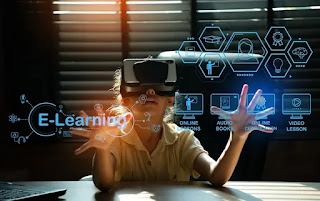The quick addition of technology in education,
commonly known as EdTech, has altered the way knowledge is imparted and
acquired across the globe. The education sector is experiencing a record shift
as traditional learning methods gradually give way to digital platforms. EdTech
has enhanced accessibility and flexibility and also introduced innovative
approaches that furnish to the diverse learning needs of students. This
transformation is driven by a combination of artificial intelligence, data
analytics, virtual reality, and other advanced technologies that are
influential the future of learning.
Enhancing Accessibility and Inclusivity
One of the most profound impacts of EdTech is its
ability to link the educational divide by making quality learning resources
accessible to a larger audience. Geographical barriers and socio-economic
limitations that once hindered access to quality education are now being
dismantled by digital platforms. Online courses, e-learning modules, and
virtual classrooms have enabled learners from remote and underserved areas to
participate in educational experiences that were previously beyond their reach.
Moreover, EdTech has nurtured inclusivity by accommodating students with
disabilities through assistive technologies such as screen readers,
speech-to-text software, and adaptive learning environments.
Personalized Learning Experiences
Traditional classroom settings often follow a
one-size-fits-all approach, which may not cater to the unique learning paces
and preferences of individual students. EdTech has revolutionized this model by
enabling personalized learning experiences through adaptive learning algorithms
and intelligent tutoring systems. These technologies analyze student
performance data to tailor content and instructional strategies that align with
each learner’s strengths, weaknesses, and learning styles. Consequently, students
can progress at their own pace, receiving targeted feedback and support that
enhances their overall academic performance.
Gamification and Interactive Learning
The integration of gamification in educational
platforms has introduced an element of engagement and motivation that was often
missing in traditional learning environments. EdTech platforms create a more
interactive and immersive learning experience. This approach captures the
interest of learners and also encourages them to develop critical thinking and
problem-solving skills in a collaborative setting. Also, simulations and
augmented reality applications provide practical, hands-on experiences that
reinforce theoretical knowledge, making learning more effective and enjoyable.
Connecting the Skill Gap through Lifelong
Learning
The swiftly growing job market demands a workforce
equipped with up-to-date skills and knowledge. EdTech has emerged as a powerful
enabler of lifelong learning by offering flexible and diverse learning
opportunities that cater to professionals seeking to upskill or reskill.
Massive Open Online Courses (MOOCs), micro-credentialing platforms, and online
certification programs allow learners to stay relevant in their careers by
acquiring industry-specific competencies. This shift towards continuous
learning empowers individuals to adapt to the changing demands of the global
economy, ensuring long-term career growth and sustainability.
Artificial Intelligence and Automation in
Education
Artificial intelligence (AI) has ushered in a new era
of automation and efficiency in education. AI-powered chatbots and virtual
assistants provide instant support and guidance to students, addressing queries
and facilitating learning in real-time. Automated grading systems reduce the
burden on educators by evaluating assignments and assessments with remarkable
accuracy and speed. Additionally, AI-driven content curation and recommendation
systems personalize learning paths, ensuring that students receive the most
relevant and engaging content. As AI continues to evolve, its potential to
enhance teaching and learning processes will become even more profound.
The Future of EdTech
As we look ahead, the future of EdTech promises even
greater advancements and possibilities. Emerging technologies such as
blockchain, augmented reality (AR), and virtual reality (VR) are poised to redesign
the learning landscape by offering secure, immersive, and decentralized
educational experiences. Blockchain technology can revolutionize credentialing
and verification processes, ensuring the authenticity of academic records and
certifications. Meanwhile, AR and VR can transport learners to simulated environments
that provide real-world experiences and practical knowledge. These innovations
enhance the learning process and also democratize education, making it more
accessible and inclusive.
Wrapping up, the transformative power of EdTech in
shaping the future of learning is undeniable. EdTech has the potential to
revolutionize education on a global scale. However, to fully use its benefits,
it is imperative to address the challenges and ensure that technology
complements, rather than replaces, traditional teaching methods. The future of
education will be definite by a tuneful blend of innovation, inclusivity, and
human-centric learning practices that empower learners to flourish in an advanced
world.


Post a Comment